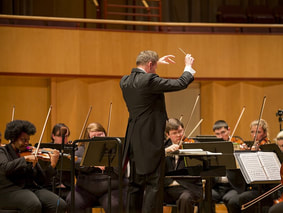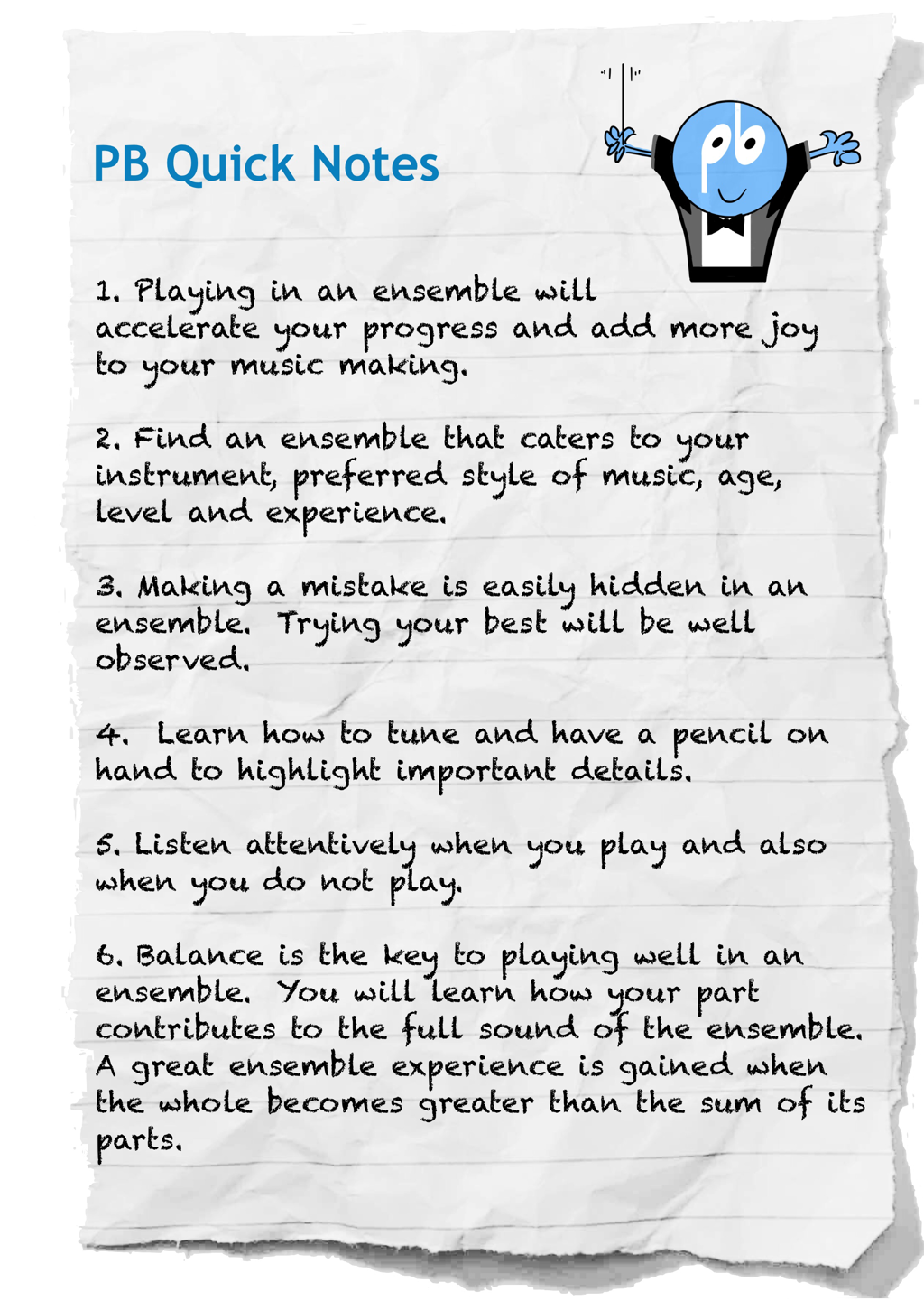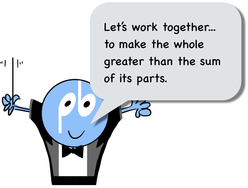|
Joy and Benefits of Shared Music Making
Attending lessons combined with effective practise will lead to improvement in your playing, but you can have far more enjoyment and acceleration in this progress by adding the experience of a shared music making activity. Based on the principle that the whole (ensemble) is greater than the sum of it’s parts (players), ensemble playing develops team work, social skills, reinforces the learning from your lessons and with first hand experience in rehearsal and performance skills, develops and strengthens key musicianship skills vital for a lifelong enjoyment of music making.
“If I mess up, I’ll look like an idiot…everyone will notice” is a very common thought from students who have hesitated in joining an ensemble. Yes, you will mess up sometimes, but it will not be noticed, as it you might be in your lessons. Everyone else around you is experiencing the same difficulties as you work towards building a successful performance together. "I find it hard to play with other people" is another familiar reason why students hesitate to join an ensemble. This just shows that there are important skills that you can still develop in your playing, skills that can be learnt by playing in an ensemble. MyMusicPB resources are here to give you the courage to join an ensemble and help you get the most benefits, success and enjoyment from your shared music making experience. It is very rare for a student to give up playing once they have joined an ensemble. |
What Ensemble to Join?
|
Getting the most out of your ensemble experience is partly dependant on joining the right ensemble for your instrument, preferred style of music, age, level and experience.
In some countries, music is taught in an ensemble setting such as The Band Method where ensemble skills are developed and appreciated from the start of your learning a musical instrument. Your instrument will determine what ensemble is available for you to play in. An orchestra will rarely cater for an electric guitarist, or a jazz ensemble with a violinist although that should never put you off from playing that particular style of music. The selection of instruments in an ensemble is usually based on the music being played which is why you will occasionally hear a saxophone in an orchestra, but not as a regular playing member. Junior level ensemble music will cater to students who have learnt a limited number of notes and rhythms. Junior School ensemble music may cater for all instruments although there are also junior level orchestras, wind bands, jazz bands, rock bands and other ensembles particular to your instrument. Progression to Intermediate and Senior level ensembles stretch your instrumental and ensemble skills further by playing more difficult pieces alongside more experienced musicians. Intermediate and Senior ensembles may also give woodwind students the opportunity to play the extended range of instruments such as the bass clarinet, piccolo, cor anglais, baritone saxophone and contrabassoon. Hopefully, you will have an ensemble at School, your local music service and community. Most Junior and Intermediate ensembles will not require an audition, actively encouraging you to join in. Progression to Senior ensembles, including county level groups will let you know the require level of proficiency to join and may require an audition. There are a number of Community ensembles that will cater for adult musicians of all levels while being an ideal social activity to meet new people. Shared music making can also be enjoyed in smaller groups from a duet of two people, trio, quartet and other combinations before a conductor is added. Getting together with friends to form a group can also be effective in an informal learning environment, as many successful rock bands have done. A trial can be a great way to start with any ensemble, although I recommend a long enough trial to experience performing in a concert together when you will experience the best part of playing in an ensemble and never look back. |
The trumpet is one of the most versatile instruments for ensemble playing. You will hear it in an orchestra, wind band, marching band, jazz band, brass ensemble, as a backing instrument in a blues, rock or pop act and in many other groups. Intermediate and Senior ensembles may also give woodwind students the opportunity to play the extended range of instruments including the bass clarinet, piccolo, cor anglais, baritone saxophone and contrabassoon. |
|
Ensemble Playing Etiquette
Playing in an ensemble involves working together with other people. You will want to enjoy your experience, but you will also want to contribute to the quality of the ensemble and the enjoyment of the other members. MyMusicPB has included some unwritten rules, many that you will learn through the experience of playing in an ensemble.
|
And for the concert:
|
|
Effective Ensemble Playing
Balance is the key to playing well in an ensemble. You may be worried about playing your individual part correctly, but it is just as important to learn how to adjust your playing to the sounds around you. When you first rehearse a piece of music, you may all be sight-reading and most of your focus will be to read through the music without stopping. A slower tempo can help you get used to the notes and rhythms, while taking note of tricky passages to practise later. There will be plenty of time to learn the notes before the concert when playing in Junior and Intermediate ensembles. Senior level ensembles have the advantage of the improved sight-reading skills and practice expectation of its members. Over the course of time in rehearsing towards a concert, the focus with the help of a conductor will lean towards learning how your individual part contributes to the full sound of the piece. You will learn how your part functions in many different ways throughout the piece and how you need to adjust to the full ensemble sound. How the composer uses the instruments together is referred to as the orchestration of the piece.
Other adjustments that you will learn to make include:
It takes time and experience to learn these skills, although it will be balanced with the enjoyment that you gain from an improved, shared performing experience. |
Making a mistake is easy hidden in an ensemble. Trying your best will be well observed. |



